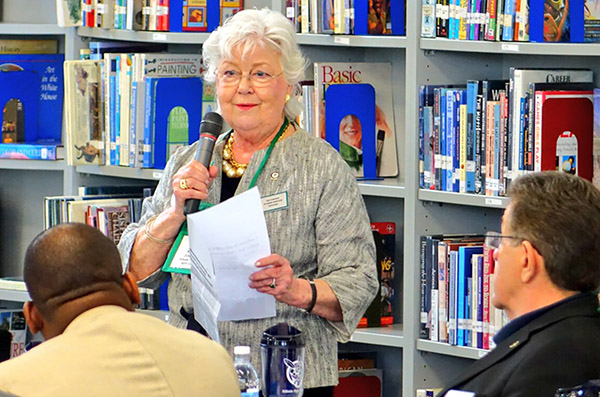The leaders of counties across the state of North Carolina have gotten together and come up with their Top Five list.
Out of thousands of suggestions and after months of debate, the North Carolina Association of County Commissioners (NCACC) has landed on five “Priority Goals” that county officials want help with from state legislators in 2019.
Now that the county officials have honed down their wish list, they are getting on with the job of petitioning their local delegations to make these a reality this year.
The goals show, among other things, the counties’ desire to enhance internet service across the state and to have more options for raising revenue – and they call for the state to prevent school boards from taking Board’s of Commissioners to court when school leaders are unhappy with the amount of county funding their school system receives for capital projects.
Guilford County Commissioner Kay Cashion serves on the NCACC Legislative Goals Commission and she just returned from the conference in Raleigh where the 2019 goals were hashed out. Cashion gave a report on those goals last week at a Guilford County Board of Commissioners meeting.
“This was the culmination of seven months of work,” Cashion said of the process, noting that 88 voting delegates and 202 county commissioners were at the conference.
In the first step of the process, in mid-2018, the Boards of Commissioners in the state’s counties narrowed down all the suggestions they received to 237 items, and later that list was reduced to 26 priorities that the NCACC Legislative Goals Commission considered.
In the end, the number one goal was a call for state legislators to help beef up the state’s information highway. It’s a goal to “Seek legislation, funding, and other efforts to expand digital infrastructure/broadband capability to the unserved and under-served areas and residents of the state.”
It’s worth noting that the number one goal of the NCACC for the state’s 2019 legislative session has a lot more to do with counties that have the fewest people in them than the more populous counties. The counties in the state with the largest number of people – like Mecklenburg, Wake, Guilford, Forsyth, Cumberland and Durham counties – already have access to broadband internet to a wide extent. While there are far more rural counties than urban counties in North Carolina, it seems surprising that the statewide organization chose as its number one goal something that’s clearly laser focused on rural counties.
However, Cashion said many counties consider this a critical issue.
“This is a great concern – a lot of the rural counties do not have broadband,” Cashion said, adding that, even in larger more populous counties there are often significant holes in service.
The second legislative goal is to provide counties with new sources of revenue to help fund education. The goal calls for the counties to have, “additional revenue sources, including a statewide bond and lottery proceeds, to equitably address statewide public school and community college capital challenges.”
The third goal also has to do with the counties’ ability to raise money. It requests that state legislators expand county options for generating revenue and it asks them to “Oppose efforts to divert to the state, fees or taxes currently allocated to the counties or to erode existing county revenue streams.”
The fourth goal seeks help from legislators in ensuring that counties have the resources they need to provide “essential public health, behavioral health and social services” – especially when it comes to jail inmates and those addicted to drugs.
As in other parts of the United States, the opioid epidemic in many North Carolina counties has put a tremendous amount of pressure on county services that address those problems. Guilford County is one county that’s been very hard hit by the epidemic.
The fifth legislative goal is a very interesting one: Take away the right of school boards to sue boards of commissioners over capital funding. It reads, “Seek legislation to repeal the statutory authority under N.C. Gen. Stat. 115C-431(c) that allows a local school board to file suit against a county board of commissioners over appropriations to the local board of education’s capital outlay fund.”
Counties provide much of the annual funding for their school systems and, many times, school leaders don’t believe the county has given them enough for operations or for capital projects such as building maintenance and repair. That has been known to happen in Guilford County – namely, it happens every year. The Guilford County Board of Education sued the Board of Commissioners over funding in 2000.
Cashion said that was a somewhat controversial goal because it drew opposition from some school officials.
“They are saying this is our only recourse,” Cashion said.
Cashion said one goal that didn’t make it into the final five, but that she would have liked to have seen included, was a request for the state to reinstate funding for local drug courts and mental health courts. According to Cashion, some counties didn’t consider that as a need since they don’t have those types of courts.

